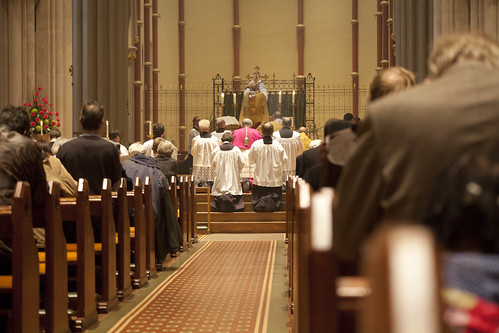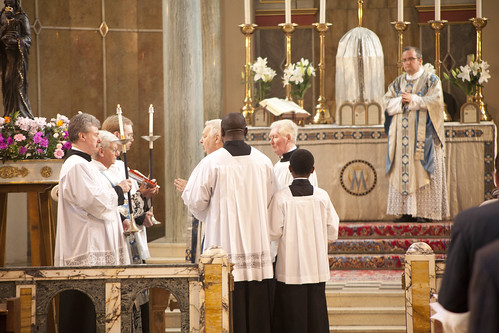 |
| Bishop Egan kneels before the Altar at the Consecration, in his Cathedral in Portsmouth |
Following on from my last post, here's another suggestion: insofar as there is a contrast between the two forms of the Mass, do all sound people need to stick with the the ecclesiology, sacramental theology, etc. etc. of the Novus Ordo? The claim that they do doesn't work, and here's why.
It is possible to have different legitimate theological schools of thought within the Church: Augustinians and Thomists and what have you. There are also, of course, illegitimate schools of thought, or schools with illegitimate aspects. One possibility, at first glance, is that the contrast between the theological emphases of the two forms of the Mass amounts to the kind of difference which implies that only one can be orthodox: they can't both be right. The point is that the supporter of the Novus Ordo has better hope this is not the case.
There are two reasons why. First, the theological emphases of the Traditional Mass are simply those of the Ordinary Magisterium of the Church since, let us say, at least the 12th century. On specific issues we can take it much further back, but the 12th century will do just fine. Everyone in the debate about the liturgy recognises that the way things are in the EF is the result of theological attitudes and ideas of the 12th century and before, in all important respects. Since that date, these have become fixed in the liturgy of Rome which spread throughout the whole of Europe and much of the world. The Church's endorsement of these liturgical forms is an extended act (or series of acts) of the Ordinary Magisterium.
Is it conceivable that the Ordinary Magisterium should be seriously mistaken on an interconnected set of issues fundamental to the Christian life over the course of 8 centuries? Of course not. If you disagree, you are simply rejecting the concept of the Ordinary Magisterium. What this means is that there is not and and there cannot be a real theological problem with anything in the EF.
The second reason is to do with the Second Vatican Council. Opponents of the EF always take their start from the Council. But the Council did not know the Novus Ordo, the Novus Ordo didn't exist at the time of the Council. The 'Mass of the Council', as Pope Benedict called it, was the EF, the Missal of 1962, and a bit the revisions of 1964. What the Council said about the liturgy has to be seen in this light. It is simply historically impossible to see the Council as supporting the theology of the OF over the theology of the EF. Yes, there are specific reforms which the Council suggests. But it never does so because of any theological problems with the old books. It is explicit and repeated in its insistence that pastoral considerations are the only ones at issue, and that after all was what the Council was all about. All the beautiful things the Council said about the liturgy, as being for example the 'source' and 'summit' of the 'Christian life', were said in the context of the Traditional Mass.
On the other hand, the actual reform which followed the Council did not have the Council's approval. It couldn't, the Council was over. It may, or may not, have followed the lines laid out by the Council. But - to spell this out - while the Council endorsed the theological exactitude of the 1962 Missal, we can only speculate what the Council would have made of the 1970 Missal. From the point of view of magisterial authority, such speculations are neither here nor there: they have no weight.
 |
| The Gospel, proclaimed towards the pagan North, Our Lady of Willesden |
For these reasons, the supporter of the Novus Ordo, if he has any sense, must say that there is no theological dissonance between the two Missals. If there is a dissonance, the Novus Ordo is in trouble: unlike the EF it is neither endorsed by the Ordinary Magisterium over 8 centuries, nor by the Extraordinary Magisterium of a General Council. It is endorsed by the Ordinary Magisterium of a few decades - a bit like the Breviary of Quignonez. The one which was promulgated in 1536 and abolished in 1568. Yup, liturgical reforms carried out by the highest authority of the Church are not guaranteed to be successful.
Supporters of the Novus Ordo should stop trying to claim that people who like the Traditional Mass are heretics: that really isn't the language of the Church of Today, is it? They should be working to make it a pastoral success. And there is really no reason why they should be jealous of the pastoral successes of the Vetus Ordo, when they happen. We are all working for the same Kingdom, aren't we?
I am reminded of a passage in that forgotten document, the Ratio fundamentatlis about Seminary education produced by the Congregation for Catholic Education in 1980.
 |
| The extinguishing of the candles at Tenebrae, St Mary Moorfields. |
Who claims that supporters of the TLM are heretics? I'm a supporter of the Novus Ordo, and I've never heard that.
ReplyDeleteI agree with you Ryan. I am a supporter of the Novus Ordo as well and in fact all I have heard all my life is the opposite actually: that Novus is not real Mass, that I should "convert" and attend a real Mass i.e. EF, etc... so I read your article and I actually felt quite the opposite. I have had to always defend the NO to people supporting the EF because they called me "not a real Catholic" and the fact is that I was never opposing the EF so I don't know what the heck is happening with our church. I am soooo tired of this "internal fight" between the so called "liberals" Vs. the so called "traditional." The fight should be about bringing LOVE and JUSTICE for all among other things. We should all be evangelizing to the whole world starting by helping the poor whether we prefer the EF of the Mass or the NO. I don't know, I may be wrong here because I am a simple person, but why add more drama when PEOPLE NEED US? Love should be “our drama.” Whether you go to the EF or NO, at the end we will be judged by LOVE... I apologize already if someone feels offended by these comments and I TRULY DON'T INTENT TO START anything here. It is just that I see a lot of "these discussions" lately and people are JUST FIGHTING so bad to win one form over the other. Of course we are going to find good arguments con and pro, but that is not the point really. MY TWO SIMPLE CENTS.
ReplyDeleteGents - obviously you won't be accused of heresy by opponents of the TLM if you *aren't yourself a supporter of the TLM*. Trust me, it does happen - not to you, but to us.
DeleteI have no desire to defend exaggerated or uncharitable attacks on the Faithful who attend the Novus Ordo, and I hope my blog contains none.
I like this part: "Thus the systematic exclusion of Latin is an abuse no less to be condemned than the systematic desire of some people to use it exclusively."
ReplyDeleteInteresting, isn't it? The last part a bit overtaken by events, of course!
DeleteTwo points about the orthodoxy of the old rite:
ReplyDelete1) It cannot be seen as wholly subject to the ordinary or the extraordinary magisterium, because its essence is part of sacred tradition, which the magisterium serves and does not govern.
2) The theological issues where the Novus Ordo differs from the old rite have been carefully described by its original designers, and subsequently by scholars like Lauren Pristas (as e.g. here: http://www.execulink.com/~dtribe/blog/Pristas.pdf). It is obvious that it is the theological principles of the Novus Ordo, not the old rite, that are incompatible with the Scriptures, tradition, and magisterial teaching.(Collegeville, Minn.: Liturgical Press, 2008), pp. 138-139.)
The liturgy as a theological source - yes indeed.
DeleteWe must get Vatican II into proper perspective. It neither changed nor taught any new dogma. It was a pastoral Council. I suspect in the history of the Church it will prove to be significant – but, sadly, for all the wrong reasons.
ReplyDeleteTurning to liturgy, the principal Mass of the Western Catholic Church is that standardised (from earlier variants) by St Pius V in 1570 and authorised in Quo Primum. It is known as the Tridentine. There are of course other Rites, and Pope Benedict recently added to this, with the Ordinariate Rite. Paul VI also added a new Rite in 1969 which, although derived from Sacrosanctum Concilium, reached somewhat beyond authorisation from that document. However, it was and is an additional legitimate Rite of the Church.
In no way, however, could it have overridden or displaced the already standard Rite, the Tridentine - as the Western Church was wrongly led to believe.
The important thing to grasp about the Novus Ordo is that the various alterations and additions which seeped into the Pauline Mass without proper sanction after 1969, do not have true validity.
Examples are, the turning from the East, the Mass as a commemorative meal, lay distributers of the Sacrament with their un-anointed hands, reception standing and in the hand, removal of the central tabernacle and altar rails, readings by non-Lectors, the dropping of Latin and Gregorian Chant, etc., all of these were unauthorised later alterations effectively attacking the Mass a Sacrifice, the Real Presence and the Ordained Priesthood.
They must all, be reviewed in the now much overdue “Reform of the Reform”, of the Novus Ordo.